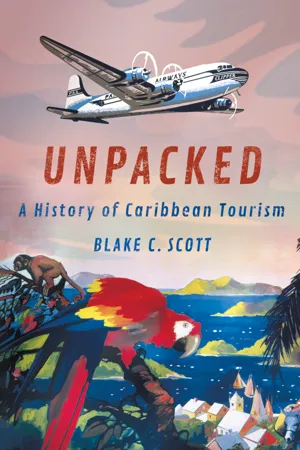
- 258 pages
- English
- ePUB (mobile friendly)
- Available on iOS & Android
About this book
Unpacked offers a critical, novel perspective on the Caribbean's now taken-for-granted desirability as a tourist's paradise. Dreams of a tropical vacation have become a quintessential aspect of the modern Caribbean, as millions of tourists travel to the region and spend extravagantly to pursue vacation fantasies. At the beginning of the twentieth century, however, travelers from North America and Europe thought of the Caribbean as diseased, dangerous, and, according to many observers, "the white man's graveyard." How then did a trip to the Caribbean become a supposedly fun and safe experience?
Unpacked examines the historical roots of the region's tourism industry by following a well-traveled sea route linking the US East Coast with the island of Cuba and the Isthmus of Panama. Blake C. Scott describes how the cultural and material history of US imperialism became the heart of modern Caribbean tourism. In addition, he explores how advances in tropical medicine, perceptions of the tropical environment, and development of infrastructure and transportation networks opened a new playground for visitors.
Frequently asked questions
- Essential is ideal for learners and professionals who enjoy exploring a wide range of subjects. Access the Essential Library with 800,000+ trusted titles and best-sellers across business, personal growth, and the humanities. Includes unlimited reading time and Standard Read Aloud voice.
- Complete: Perfect for advanced learners and researchers needing full, unrestricted access. Unlock 1.4M+ books across hundreds of subjects, including academic and specialized titles. The Complete Plan also includes advanced features like Premium Read Aloud and Research Assistant.
Please note we cannot support devices running on iOS 13 and Android 7 or earlier. Learn more about using the app.
Information
Table of contents
- List of Illustrations
- Foreword
- Preface: The Problem of Mobility
- Acknowledgments
- Introduction: Growing up in Florida’s Vacationland
- 1. Empire’s Lake: Tourism in the Wake of US Expansion
- 2. Service Sector Republics: Transnational Development in Panama and Cuba
- 3. Changing Routes from Sea to Air: The Rise of Pan American World Airways
- 4. The Nature of Tourism: Naturalist Explorers as Scientific Guides
- 5. Traveling Writers: Literary Dreams of Tropical Escape
- 6. Burning Privilege: Luxury in the Age of Decolonization
- Conclusion: Perilously Cruising into the Future
- Notes
- Bibliography
- Index